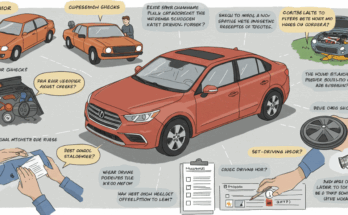It’s 2025, and the debate between electric and gas cars is hotter than ever. Picture this: you’re standing at a car dealership, keys dangling in front of you—one for a sleek electric vehicle (EV) humming with quiet power, the other for a trusty gas-powered ride that roars to life. Which do you choose? It’s not just about style or sound anymore; it’s about cost, performance, and the planet. This year, I’ve dug into the latest trends, crunched the numbers, and talked to real people to determine which one comes out on top. Spoiler: it’s not a one-size-fits-all answer, but you’ll know what’s best for you.
Let’s break it down with a mix of real-life stories, complex data, and a little fun—because choosing a car should feel exciting, unlike a math exam.
The Big Picture: Why It Matters in 2025
The world’s changing fast. Gas prices are bouncing around like a yo-yo, climate concerns are front-page news, and carmakers are pumping out EVs like they’re the next big thing (spoiler: they are). In 2024 alone, electric car sales hit over 18 million globally, a 35% jump from the year before, according to industry reports. Meanwhile, gas cars still dominate the roads—about 80% of new car sales in the U.S. last year were gas-powered. So, what’s shifting the tide?
For starters, technology. EVs are getting better batteries, longer ranges, and faster charging times. Gas cars? They’re holding steady with improved fuel efficiency but not reinventing the wheel. Then there’s the vibe—driving an EV feels futuristic, while a gas car feels like a reliable old friend. This year, it’s all about weighing the pros and cons with fresh eyes.
Cost Breakdown: Your Wallet’s Vote
Let’s talk money—because who doesn’t want to save a buck? Upfront, EVs can still sting. A base-model Tesla Model 3 runs around $40,000 in 2025, while a comparable gas-powered Honda Civic might set you back $25,000. But hold up—that’s just the sticker price.
Long-Term Savings
Here’s where EVs flex their muscles. My buddy Jake swapped his gas-guzzling SUV last year for a Hyundai Ioniq 5. “I was skeptical,” he told me, “but I’m saving like $100 a month on gas and oil changes.” Research backs him up: the average EV owner saves about $1,000 yearly on fuel and maintenance. Electricity is cheaper than gas (especially if you charge at home), and EVs have fewer moving parts—no oil changes, no transmission headaches.
Gas cars fight back with lower repair costs when things go wrong. A Consumer Reports study from late 2023 found EVs have 79% more problems—think battery issues or glitchy software—than gas cars. But as tech improves in 2025, those gaps are closing.
Incentives and Hidden Costs
Don’t sleep on EV tax credit,s either. In the U.S., you can still snag up to $7,500 off a new electric car, depending on the model. Gas cars? No such luck. Plus, the savings add up fast if you’re in a state like California with sky-high gas prices (hovering near $5 a gallon this year On the flip side, installing a home charger could cost you $500 to $2,000—something gas folks don’t worry about.
Winner? EVs edge out gas cars on long-term savings, but only if you can stomach the upfront hit.
Performance: Power Meets Personality
Driving isn’t just about getting from A to B—it’s about the feel. Gas cars have that growl, that visceral kick when you hit the pedal. EVs? They’re silent assassins, delivering instant torque that pins you to your seat.
Speed and Handling
Take my neighbor Sarah, a self-proclaimed car nut. She test-drove a Ford Mustang Mach-E and couldn’t stop grinning. “It’s like a rocket,” she said. “Zero to 60 in under four seconds—no gas car in that price range can touch it.” She’s right—EVs like the Mach-E or Tesla Model Y outpace most gas rivals thanks to electric motors’ instant power delivery.
Gas cars still shine for long hauls. A Toyota Camry can cruise 500 miles on a tank and refuel in five minutes. Most EVs run 300-400 miles per charge, and even fast chargers take 20-30 minutes. Range anxiety’s real, folks—I felt it last month when my rental EV dipped below 10% on a rural road trip.
The Fun Factor
Gas engines have a soul—think of a V8’s rumble. EVs counter with techy perks like one-pedal driving (slow down just by easing off the accelerator) and over-the-air updates that make your car smarter overnight. In 2025, it’s a toss-up: thrill-seekers lean gas, tech-lovers go electric.
Environmental Impact: Green Vibes Only
If you’re losing sleep over climate change, this one’s big. EVs promise zero tailpipe emissions, but are they cleaner? Let’s dig in.
The Carbon Footprint Truth
A 2024 study from the Union of Concerned Scientists found that, over their lifetime, EVs produce 50% fewer emissions than gas cars—even when you factor in battery production and dirty power grids. EVs are squeaky clean in places like Washington State, where hydropower rules. In coal-heavy West Virginia? Less so, but still better than gas.
Gas cars, meanwhile, pump out about 4.6 metric tons of CO2 per year, per the EPA. My coworker Mike loves his Jeep Wrangler, but he winced when I showed him that stat. “I didn’t realize it added up that much,” he admitted.
Battery Blues
EVs aren’t saints—battery mining for lithium and cobalt can get messy, environmentally and ethically. But gas? Drilling oil and refining fuel isn’t exactly a picnic either. 2025 EVs will win the green crown, especially as renewable energy grows.
Convenience: Living the Dream (or Nightmare)
Your lifestyle matters. EVs and gas cars cater to different vibes.
Charging vs. Refueling
Gas wins hands-down for speed—five minutes at the pump, and you’re golden. EVs need planning. Public chargers are popping up—over 200,000 in the U.S. now—but they’re less common than gas stations. Jake’s golden rule? “Charge overnight at home, and you’re set.” If you can’t, though, it’s a hassle.
Road Trips and Range
Gas cars rule the open road. EVs are catching up—models like the Lucid Air hit 500+ miles—but charging stops slow you down. I’d pick gas for a spontaneous cross-country adventure but for daily commutes? EV all the way.
The Verdict: Who Wins in 2025?
So, who takes the crown? It depends on you. IEVs are your champ if you’re a city dweller who can charge at home, loves tech, and wants to save cash long-term; if you crave freedom, love the engine’s purr, and don’t trust charging networks yet, gas holds strong.
For me, it’s electric. I’m sold on the quiet ride and lower bills—plus, I feel a little smug about the planet. But I get why Mike sticks with his Jeep. In 2025, there’s no wrong answer—just the right one for your life.
Your Burning Questions Answered
Are electric cars cheaper to run than gas cars?
Yes, usually! Though upfront costs are higher, EVs save about $1,000 annually on fuel and maintenance.
How long do EV batteries last?
Most last 10-20 years, or 100,000-200,000 miles, per manufacturers like Tesla and Nissan.
Can I take an EV on a road trip?
You can, but plan. Range varies (200-500 miles), and charging takes longer than refueling.
Are gas cars being phased out?
Not yet, but some countries aim for 2035. Gas will still rule in 2025, though EVs are gaining fast.
Which is better for the environment?
EVs, hands down. They cut lifetime emissions by half compared to gas cars, even with battery production.




